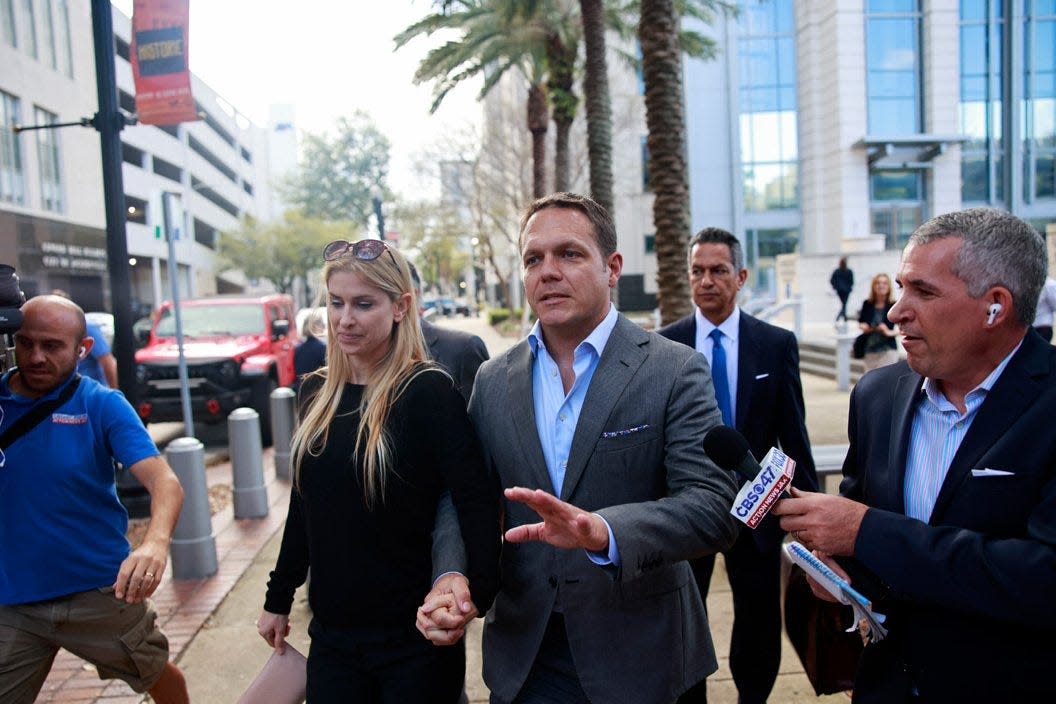Times-Union, Jacksonville TV stations oppose request to close hearing in JEA criminal case

A coalition of Jacksonville media companies, including The Florida Times-Union, First Coast News, WJXT and WJAX, have asked U.S. Magistrate Judge Monte Richardson to reject a request from former JEA executives Aaron Zahn and Ryan Wannemacher to hold significant portions of a key pre-trial hearing next month behind closed doors.
Attorneys for the newspaper and TV stations asked to intervene this week in the pre-trial proceedings in the government's prosecution of Zahn and Wannemacher on conspiracy and wire fraud charges, the culmination of a long-running controversy that centered on a failed effort in 2019 to sell JEA — Jacksonville's city-owned electric, water and sewer utility — to a private firm. The two former utility leaders have formulated a joint defense strategy seeking to have U.S. District Judge Brian Davis weaken the hand of prosecutors ahead of the October trial or to toss the indictment entirely.
Key to that strategy is a complex argument that federal prosecutors may have violated their constitutional right against self-incrimination, a question that will be debated in a special proceeding called a Kastigar hearing next month. Ahead of that hearing, Zahn and Wannemacher's defense lawyers asked the magistrate judge assigned to the case, Richardson, to consider closing large portions of the hearing to the public.
"The community has a vested interest in this case, and The Times-Union strenuously opposes restricting public access to any portion of the proceedings," said T-U Executive Editor Paul Runnestrand.
Defense attorneys have zeroed in on sworn statements Zahn and Wannemacher provided to City Hall attorneys in late 2019 amid a workplace investigation into various controversies that had overtaken the effort they were leading to privatize JEA. Both men were compelled to cooperate in those interviews, meaning they were extended legal protections ensuring nothing they said in those settings could later be used against them in a prosecution. The federal government has said it did not use those statements when it presented the case to a grand jury, but the joint defense team has said the wide local publicity their statements received in real time — the transcripts of their protected interviews became public records that were reported on — has potentially tainted the entire case.
"The extensive publicity the Defendants’ compelled statements have received was largely outside the Court’s ability control or limit," Zahn and Wannemacher's attorneys wrote. "It is, however, within the power of the Court to prevent the Kastigar hearing from magnifying the publicity the statements have already received."
"While stemming the tide of publicity regarding the Defendants’ compelled testimony may be too little, too late, the Court should take steps to ensure that the Kastigar hearing does not exacerbate the harm caused by the prior publicity the Defendants’ compelled statements."
They asked Richardson to consider closing to the public out of "any portions of the proceedings where the Defendants’ compelled statements may be discussed, including the Defendants’ examination or cross-examination of any witness who may have been exposed to the Defendants’ compelled testimony ..."
Given the nature of the conflict between federal prosecutors and the defense that is set to be discussed, granting such a request would lock the public out of significant portions of the Kastigar hearing and limit public understanding of the proceedings, particularly since the defense team has also asked the magistrate judge to consider redacting those same portions of the hearing in the court transcripts that are made available later.
Given the "common law and constitutional right for the public and media to attend all portions of a criminal trial, including pretrial hearings," the former utility executives failed to justify the extraordinary step of closing the courtroom, Holland & Knight attorney Jennifer A. Mansfield, who is representing the Times-Union and First Coast News, wrote in the companies' motion to intervene.
Such a request could only be granted, Mansfield wrote, at "an evidentiary hearing, by a preponderance of the evidence (establishing) why a complete ban on the public and the media is needed and why less restrictive means would be insufficient."
"Ironically, although the indictments themselves result from a lack of transparency in public proceedings, Defendants now seek to exclude the public and the media from the courtroom in order to prevent them hearing and reporting on matters that have already been the subject of reporting," Mansfield wrote.
Throughout the majority of their protected statements, Zahn and Wannemacher defended themselves and their actions. They have not identified any specific portions of the interviews they believe prosecutors may have used and have emphasized that the publicity alone might be enough to have poisoned the case. Wannemacher is separately asking the court to consider statements he made during a public meeting organized by Jacksonville City Council members to be protected — a request his attorneys acknowledged presented novel legal questions.
Prosecutors rejected the arguments advanced by the defense that the publicity of Zahn and Wannemacher's compelled statements has "tainted" their investigation. Such an argument, they have told the court, represents a "quantum leap" in existing law.
Neither the defense nor federal prosecutors have weighed in on the media companies' requests to intervene.
Nate Monroe is a metro columnist whose work regularly appears every Thursday and Sunday. Follow him on Twitter @NateMonroeTU.
This article originally appeared on Florida Times-Union: Times-Union, TV stations oppose request to close JEA court hearing


